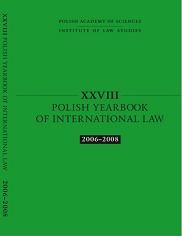Economic Support to Terrorism in EU Case Law
Economic Support to Terrorism in EU Case Law
Author(s): Pavel SvobodaSubject(s): Law, Constitution, Jurisprudence
Published by: Instytut Nauk Prawnych PAN
Keywords: ECJ; EC Treaty; terrorism
Summary/Abstract: This article discusses new developments concerning the lawfulness of EU anti-terrorism measures in relation to the UN Security Council (UNSC) resolutions. The European Court of Justice (ECJ), in joined cases C-402/05 P and C- 415/05 P Yassin Abdullah Kadi and Al Barakaat International Foundation (Judgment), considered two appeals – in the cases T-306/01 Yusuf and T-315/01 Kadi. In this sequel of actions for annulment pursuant to Article 234 TEC, the ECJ not only set aside the judgments of the Court of First Instance (CFI) in both cases, but expressed its opinion on the substance of the case by annulling the contested Regulation No 881/2002 (Regulation), implementing Common Position 2002/402/CFSP, which itself implements UNSC Resolution No 1390 (2002) imposing measures directed against Osama bin Laden, members of Al-Qaeda and the Taliban, and persons associated with them. These legal acts are aimed at freezing the assets of persons related to terrorists in order to prevent terrorist operations. The Regulation was repealed only in so far as it concerned the appellants. The contested regulation was annulled since it failed to ensure the following rights of the appellants: right to respect for property, right to be heard and right to effective judicial review. From a legalistic perspective, the setting aside of the Judgments of the CFI in Yusuf and Al Barakaat is deplorable, since the CFI dealt for the first time in detail with various facets of the relationship between the international and Community legal systems. The ECJ did not refute its conclusions in this matter, nor did it give its own opinion, it simply repealed it. This article is highly critical of the ECJ’s absence of justification as to why the EC is to take over the obligations of the Member States stemming from the UN Charter as far as economic sanctions are concerned. On the other hand, the article praises the coherence with which the ECJ defends the autonomy of the international and Community legal systems, even if its argumentation sometimes seems too formalistic. But law itself needs to be, to a certain extent, formalistic for it to be of general application.
Journal: Polish Yearbook of International Law
- Issue Year: 2008
- Issue No: 28
- Page Range: 137-147
- Page Count: 11
- Language: English
- Content File-PDF

